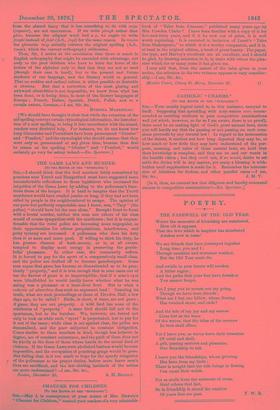THE GAME LAWS AND MURDER.
(TO THE EDITOR OF THE " SPECTATOR:1
SLa,—I should think that the foul murders lately committed by poachera near Yeovil and Hungerford must have suggested some uncomfortable reflections to those legislators who increased the iniquities of the Game Laws by adding to the policeman's func- tions those of the keeper. It is hard to imagine that the Yeovil murderers would have evaded justice so long, if they had not been aided by people in the neighbourhood to escape. The opinion of ondpoor but perfectly respectable man I know, was, " They " (the police) "should have let the men alone." Brought front to front 'with a brutal murder, neither this man nor others of his class would of course sympathise with the murderers ; but it is unques- tionable that the rural police are becoming more unpopular, as their opportunities for odious perquisitions, interference„ and petty tyranny are increased. A policeman who does his duty -does it at more and more peril. If willing to shirk his duty, he has greater chances of hush-money, or is, at all events, tempted to display most energy in preserving the gentle- folks' pheasants. In either case, the community suffers. It is forced to pay for the sport of a comparatively small class, and the police are drafted off to become gamekeepers. Some men argue that game has become so domesticated as to be prac- tically "property," and it is true enough that in nine cases out of ten the flavour of game is so imperceptible, that if a man's eyes were blindfolded he would hardly know whether what he was -eating was a pheasant or a barn-doer fowl. But to what a reductio ad absurdum does such an argument lead ! Granting its truth, what are such proceedings as those of Elvedon Hall, a few -days ago, to be called ? Birds, in short, if tame, are not game ; if game, they are not property. A wild bird has none of the attributes of "property." A tame bird should fall not to the sportsman, but to the butcher. We, however, are forced not only to look on while such " sport " is perpetrated, but to pay for it out of the taxes ; while class is set against class, the police are demoralised, and the poor subjected to constant indignities. Cases similar to these murders in kind, though less heinous in degree, are of constant occurrence, and the guilt of them does not lie wholly at the door of those whose hands do the actual deed of violence. If the Game Laws were abolished battues would become impossible, and the occupation of poaching gangs would be gone. But failing that, is it too much to hope for the speedy relegation j of the policeman to his proper duties, before more brave men's lives are sacrificed, and the law-abiding instincts of the nation are more undermined ?—I am, Sir, &c.,


































 Previous page
Previous page